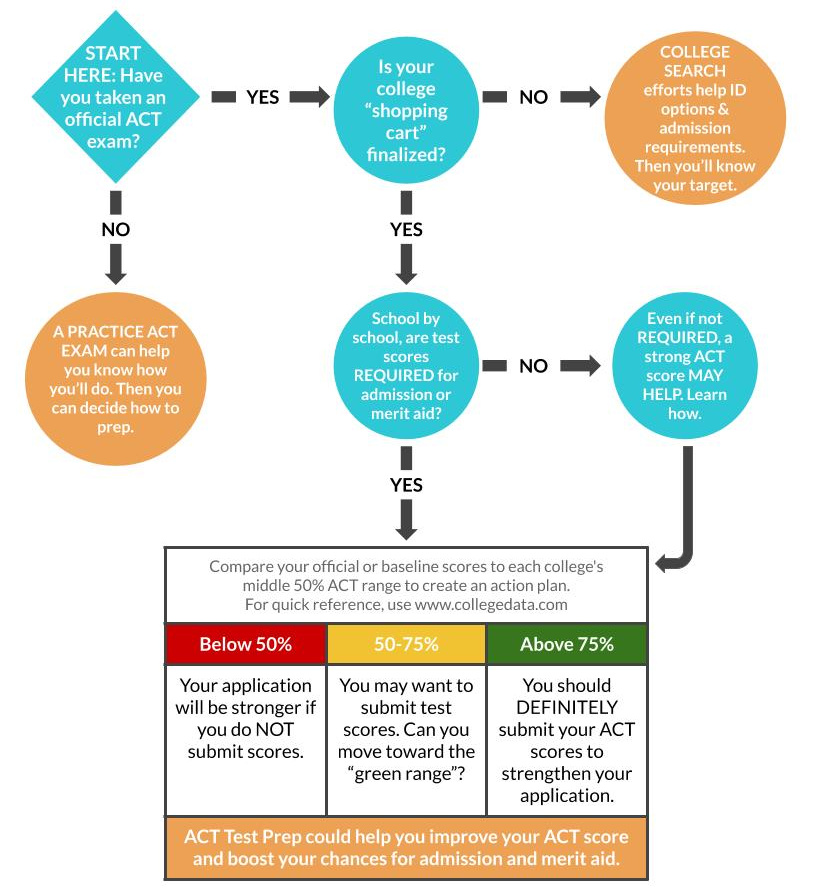“With so many schools being test optional for the classes of 2021 and 2022, can I just ignore the ACT?” This is a really common question we’ve received lately from high-school students and parents. Too many people are taking an all or nothing approach, thinking that either 1) nothing’s changed, or 2) everything’s changed, and the ACT is just going away. The real answer is an involved conversation that’s specific to your student, their scores and the schools they’re considering. To talk through your student’s unique situation, schedule a free consult anytime.
We recorded a Facebook Live training on this topic, and you can watch that video right now. For seniors in the midst of college applications, we recorded a special Facebook Live training just for seniors; watch it here.
If you’re a junior or the parent of a junior, this flowchart makes a complex decision process a bit more simple. We walk through it in the video and in the blog post below. Download the PDF here.
Could a strong ACT score help the Class of 2022 for college admissions?

Dig deeper than just whether you HAVE to have an ACT score or not in order to apply. The more important question is, could a strong ACT score HELP YOU?
Think about a baseball player who spends extra time working on their swing or a basketball player who invests time stroking those threes. They’re controlling what they can control. They want a competitive edge to get up to varsity or increase their chances to play at the next level. The same is true with the ACT. It’s not what you HAVE to do. It’s what you CAN do to play at your best possible level. The goal when you’re a junior is to enhance and expand college options.
Putting in extra effort could benefit you, even if ACT scores are not REQUIRED for admission.
This is because test-optional doesn’t mean test BLIND. Test-optional schools don’t REQUIRE you to submit an ACT or SAT score as part of your college application, but they WILL consider it if you submit it. Wouldn’t it be great to have an ACT score in hand that you WANT to submit because it strengthens your application?
If you’re able to earn an ACT score that is within (and ideally at the higher end of) a school’s “mid-range ACT”, then that ACT score COULD help you gain acceptance to that school.
It’s like playing with 5 strong cards in your hand versus just 4 cards. The top five things that schools look for when you apply, in order of importance, are:
- A rigorous high-school curriculum including challenging courses
- Your GPA
- Your ACT or SAT score
- Your college essay
- Your extra-curricular activities
For test-optional schools, if you skip #3, they don’t penalize you. They evaluate you as an applicant based on the other four things. If those four things are exceptionally strong, then you don’t need the ACT score to get in. If those other four elements combined are NOT better-than-average compared to that school’s admitted students, then a strong ACT score could STILL be an important card to play for college applications.
For juniors still shopping for schools, a stronger ACT score can expand options.

When I’m looking at colleges, I’m comparing my practice ACT exam score to the “mid-range ACT scores” for the schools I’m looking at to see how I stack up. To do this, go to collegedata.com and set up a free account. Look up the mid-range ACT scores for schools you’re considering. How does your score compare? Juniors, if you haven’t yet taken a full-length ACT practice exam to gauge how you’ll do on the real thing, sign up here to do so FREE at our office.
Let’s look at one example. The University of Wisconsin’s middle 50% ACT range is 27-32. That means half of the kids who applied and were accepted last year (whether or not they chose to be Badgers) came in between a 27 and a 32 on the ACT. One quarter of UW’s accepted students were below a 27, and one quarter were above a 32. That’s really high.
To discover the middle-50% ACT ranges at schools you’re considering, set up an account on collegedata.com, and look it up. Or email me, and we’ll help you figure it out.
If early on in your junior year, you take a practice ACT exam and don’t like what you see, you then have time to consider your options.
What are my options to gain a stronger ACT score for college applications?
The best option depends on each student and the schools they’re considering. Looking at an example of a student who wants to attend UW and is sitting with a 24 on the ACT, consider these options.
- With a super strong GPA, you may be able to withhold your ACT scores and still be accepted. The UW’s average GPA for admitted students is 3.86. If you have a 4.0, a rigorous curriculum for your high-school courses, a great essay and outstanding extracurricular activities, then you have four strong cards in your hand to play, and you don’t need that 5th card: a strong ACT score.
- If your GPA isn’t at or above the average GPA for admitted students, then can you move your ACT score up? We’re working with a ton of students who want to invest time preparing for the ACT in order to have another strong card in their hand to play for college admissions, even for schools where ACT scores are optional.
- Depending on which schools you’re considering, it’s not just a matter of getting in. You’ll also want to consider whether stronger ACT scores could help you earn merit aid that saves you thousands on college tuition. If you’re a Wisconsin resident and looking at UW, this isn’t a big consideration. But if you’re looking at out-of-state schools or private schools, and they include ACT scores for merit aid consideration, that strong ACT score could help you save money on college tuition.
How can a strong ACT score help you save money on college?

Merit aid scholarships have nothing to do with financial need. For out-of-state public universities as well as for private colleges and universities, you should be looking at not just admission requirements, but also merit aid criteria.
Depending on the schools you’re considering, even if you can earn admittance with (or without) an ACT or SAT score, you may want to strengthen your scores to save money on tuition. This is a school-by-school, student-by-student conversation, and we can talk that through with you during a free consult.
What’s next for juniors wondering about the ACT and college options?
Juniors, now’s the time to figure out what the middle 50% ACT ranges and average GPAs are at schools you’re considering. That way, you’ll know what you’re shooting for.
If you’ve not yet taken a practice ACT exam and want to do so for free, you can schedule that here.
If you’d like to talk through your college options, or are just getting started thinking about what you are looking for in your ideal college experience, schedule a free consult or explore our College Search services.
If you’re not sure whether or not ACT Test Prep is a worthwhile investment for you, or you wonder what your ACT Test Prep options are, email me and let’s talk it through. I’m always happy to answer questions to help students and parents get clear and get confident about your college choices.



Recent Comments